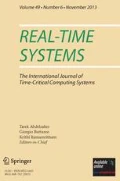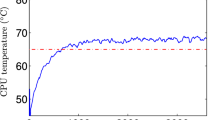Abstract
With the evolution of today’s semiconductor technology, chip temperature increases rapidly mainly due to the growth in power density. Therefore, for modern embedded real-time systems it is crucial to estimate maximal temperatures early in the design in order to avoid burnout and to guarantee that the system can meet its real-time constraints. This paper provides answers to a fundamental question: What is the worst-case peak temperature of a real-time embedded system under all feasible scenarios of task arrivals? A novel thermal-aware analytic framework is proposed that combines a general event/resource model based on network and real-time calculus with system thermal equations. This analysis framework has the capability to handle a broad range of uncertainties in terms of task execution times, task invocation periods, jitter in task arrivals, and resource availability. The considered model takes both dynamic and leakage power as well as thermal dependent conductivity into consideration. Thorough simulation experiments validate the theoretical results.









Similar content being viewed by others
Notes
This is exactly where the work-conserving assumption is effective. That is, without this work-conserving assumption, arbitrarily many workload can be delayed and accumulated regardless of resource availability making γ unbounded.
As S(t) implies an operating mode at moment t, it is not a continuous function.
References
Bansal N, Pruhs K (2005) Speed scaling to manage temperature. In: STACS
Bansal N, Kimbrel T, Pruhs K (2004) Dynamic speed scaling to manage energy and temperature. In: FOCS
Brooks D, Martonosi M (2001) Dynamic thermal management for high-performance microprocessors. In: HPCA ’01: proceedings of the 7th international symposium on high-performance computer architecture. IEEE Computer Society, Washington, p 171
Brooks D, Tiwari V, Martonosi M (2000) Wattch: a framework for architectural-level power analysis and optimizations. In: ISCA ’00: proceedings of the 27th annual international symposium on computer architecture. ACM, New York, pp 83–94
Chantem T, Dick RP, Hu XS (2008) Temperature-aware scheduling and assignment for hard real-time applications on MPSoCs. In: Design, automation and test in Europe
Chantem T, Hu XS, Dick RP (2009) Online work maximization under a peak temperature constraint. In: Henkel J, Keshavarzi A, Chang N, Ghani T (eds) ISLPED. ACM, New York, pp 105–110
Chen J-J, Hung C-M, Kuo T-W (2007) On the minimization of the instantaneous temperature for periodic real-time tasks. In: IEEE real-time and embedded technology and applications symposium
Chen J-J, Wang S, Thiele L (2009) Proactive speed scheduling for real-time tasks under thermal constraints. In: RTAS. IEEE Computer Society, Los Alamitos, pp 141–150
Fisher N, Chen J-J, Wang S, Thiele L (2009) Thermal-aware global real-time scheduling on multicore systems. In: RTAS
Fu X, Wang X, Puster E (2009) Dynamic thermal and timeliness guarantees for distributed real-time embedded systems. In: RTCSA. IEEE Computer Society, Los Alamitos, pp 403–412
Fu Y, Kottenstette N, Chen Y, Lu C, Koutsoukos X, Wang H (2010) Feedback thermal control for real-time systems. In: RTAS
Gomaa M, Powell MD, Vijaykumar TN (2004) Heat-and-run: leveraging SMT and CMP to manage power density through the operating system. In: ASPLOS-XI: proceedings of the 11th international conference on architectural support for programming languages and operating systems. ACM, New York, pp 260–270
Huang M, Renau J, Yoo S-M, Torrellas J (2000) A framework for dynamic energy efficiency and temperature management. In: International symposium on microarchitecture
Huang W, Skadron K, Gurumurthi S, Ribando RJ, Stan MR (2009) Differentiating the roles of IR measurement and simulation for power and temperature-aware design. In: ISPASS, pp 1–10
Hung W-L, Xie Y, Vijaykrishnan N, Kandemir MT, Irwin MJ (2005) Thermal-aware task allocation and scheduling for embedded systems. In: ACM/IEEE conference of design, automation, and test in Europe
Kumar P, Thiele L (2011) Cool shapers: shaping real-time tasks for improved thermal guarantees. In: Proc of design automation conference (DAC 2011). ACM, San Diego
Kumar A, Shang L, Peh L-S, Jha NK (2006) HybDTM: a coordinated hardware-software approach for dynamic thermal management. In: DAC, pp 548–553
Le Boudec J-Y, Thiran P (2001) Network calculus—a theory of deterministic queuing systems for the Internet. Lecture notes in computer science, vol 2050. Springer, Berlin
Liao W, He L, Lepak K (2005) Temperature and supply voltage aware performance and power modeling at microarchitecture level. IEEE Trans Comput-Aided Des Integr Circuits Syst 24(7):1042–1053
Liu Y, Dick RP, Shang L, Yang H (2007) Accurate temperature-dependent integrated circuit leakage power estimation is easy. In: DATE. EDA Consortium, San Jose, pp 1526–1531
Murali S, Mutapcic A, Atienza D, Gupta R, Boyd S, Micheli GD (2007) Temperature-aware processor frequency assignment for mpsocs using convex optimization. In: CODES/ISSS
Quan G, Zhang Y, Wiles W, Pei P (2008) Guaranteed scheduling for repetitive hard real-time tasks under the maximal temperature constraint. In: Gebotys CH, Martin G (eds) CODES/ISSS. ACM, New York, pp 267–272
Rai D, Yang H, Bacivarov I, Chen J-J, Thiele L (2011) Worst-case temperature analysis for real-time systems. In: Design, automation and test in Europe
Skadron BK (2004) HotSpot: thermal modeling. http://lava.cs.virginia.edu/HotSpot/index.htm [Online]. Available: http://lava.cs.virginia.edu/HotSpot/index.htm
Skadron K, Stan MR, Sankaranarayanan K, Huang W, Velusamy S, Tarjan D (2004) Temperature-aware microarchitecture: modeling and implementation. ACM Trans Archit Code Optim 1(1):94–125
Thiele L, Chakraborty S, Naedele M (2000) Real-time calculus for scheduling hard real-time systems. In: ISCAS, vol 4, pp 101–104
Walkey D, Smy T, MacElwee T, Maliepaard M (2001) Linear models for temperature and power dependence of thermal resistance in si, inp and gaas substrate devices. In: Seventeenth annual IEEE symposium on semiconductor thermal measurement and management, pp 228–232
Wandeler E, Thiele L (2006) Interface-based design of real-time systems with hierarchical scheduling. In: RTAS ’06: proceedings of the 12th IEEE real-time and embedded technology and applications symposium. IEEE Computer Society, Washington, pp 243–252
Wandeler BE, Thiele L (2008). Real-Time Calculus (RTC) toolbox. http://www.mpa.ethz.ch/Rtctoolbox [Online]. Available http://www.mpa.ethz.ch/Rtctoolbox
Wandeler E, Maxiaguine A, Thiele L (2006) Performance analysis of greedy shapers in real-time systems. In: DATE, pp 444–449
Wang S, Bettati R (2006a) Delay analysis in temperature-constrained hard real-time systems with general task arrivals. In: RTSS
Wang S, Bettati R (2006b) Reactive speed control in temperature-constrained real-time systems. In: Euromicro conference on real-time systems
Wang S, Bettati R (2008) Reactive speed control in temperature-constrained real-time systems. Real-Time Syst 39(1–3):658–671
Wang Y, Ma K, Wang X (2009) Temperature-constrained power control for chip multiprocessors with online model estimation. In: Keckler SW, Barroso LA (eds) ISCA. ACM, New York, pp 314–324
Yang Y, Gu Z, Zhu C, Dick RP, Shang L (2007) Isac: integrated space-and-time-adaptive chip-package thermal analysis. IEEE Trans Comput-Aided Des Integr Circuits Syst 26(1):86–99
Yang C-Y, Chen J-J, Thiele L, Kuo T-W (2010) Energy-efficient real-time task scheduling with temperature-dependent leakage. In: ACM/IEEE conference of design, automation, and test in Europe (DATE)
Yao F, Demers A, Shenker S (1995) A scheduling model for reduced CPU energy. In: Symposium on foundations of computer science
Zhang S, Chatha KS (2007) Approximation algorithm for the temperature-aware scheduling problem. In: ICCAD
Acknowledgements
The work described in this paper has been funded by EU FP7 project EURETILE under grant number 247846 and partially supported by the TRANSCEND Strategic Action from Nano-Tera.ch.
Author information
Authors and Affiliations
Corresponding author
Rights and permissions
About this article
Cite this article
Yang, H., Bacivarov, I., Rai, D. et al. Real-time worst-case temperature analysis with temperature-dependent parameters. Real-Time Syst 49, 730–762 (2013). https://doi.org/10.1007/s11241-013-9188-y
Published:
Issue Date:
DOI: https://doi.org/10.1007/s11241-013-9188-y




